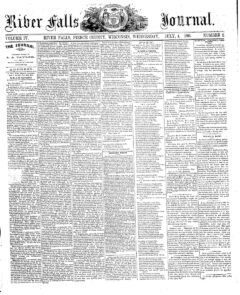More than 150 years ago, journalists working in western Wisconsin gathered in the river town of Prescott for the second annual meeting of the St. Croix Valley Editorial Association. They heard from I.N. Van Slyke, former editor of the Hudson Chronicle, whose speech offers valuable insight into the newspaper business of the region during the mid-19th century.

The text of the speech was printed in at least two newspapers, the River Falls Journal on July 4, 1860, and The Prescott Transcript on July 7, 1860. Students in my media history course will be asked to read the speech and mine it for information that will help them understand the nature of journalism in a region of antebellum America. The speech would be part of a larger project involving studying The Prescott Paraclete, the first newspaper published in Pierce County five years earlier.
Van Slyke spoke about the progress the craft of newspapering had made in the region, as well as of the “hard times” that recently had affected a number of publications. He also addressed concerns about how rivalries among publishers had reduced the quality of journalism. “Of all things to be dreaded, of all things despicable in the eyes of all honest men, first, stands a venal Press,” he said.
After reading the speech, students could research any number of questions that would allow them to explore journalism in the 1860s. For example:
- Who was I.N. Van Slyke?
- In the speech, Van Slyke mentioned eight newspapers. What were they, when were they published and by whom, and where can we obtain copies for further research?
- What were the “hard times” to which Van Slyke referred? Were they limited to newspapers or did they affect other aspects of the regional or national economy?
- Van Slyke criticized “puffing” that he observed in the region’s newspapers. What did he mean? Can we find examples of “puffing” in newspapers of the period?
The text also is full of words and phrases that might stymie undergraduates, including my favorite quote: “Hoary error, tyrants, and corrupt governments, more fear the argus eyes and bold speech of a FREE PRESS than a thousand foes.” Asking students to create a list of these words and phrases, and then to research their meanings, would give insight into how language has changed. Creating visualizations of these words and phrases with, for example, the Google Books Ngram Viewer could reveal trends in usage. The phrase “hoary error” has a pronounced peak in the 1850s, which could lead students to ask further questions.
Given that the course strives to create a connection between media history and local history, Van Slyke’s speech is a valuable text that will allow students to develop their skills in historical thinking.
Accessed on 27 Jul 2024.
The article may be found online at https://straumanis.com/2017/speech-antebellum-journalism/.
